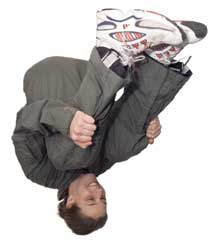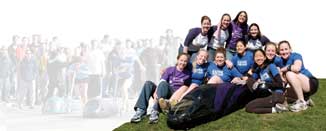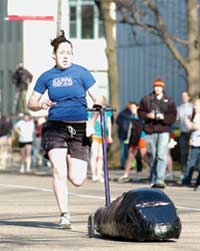What could make Spring Break in Cancun actually seem dull to a college student? Well, how about defying the Law of Gravity? Or breaking the gender barrier in a male-dominated sport?
Those were the chosen spring activities of four Carnegie Mellon biological sciences students and the sisters of Kappa Kappa Gamma.

The biosciences students went aboard NASA’s zero-gravity jet, fondly nicknamed the “Vomit Comet.” The four-engine KC-135A, a modified Boeing 707 airliner, creates brief periods of low- or zero-gravity by flying a series of “parabolas,” sharp climbs followed by steep dives, which leave the occupants weightless for 30 seconds at the peak of the climb. Meanwhile, the sisters of Kappa Kappa Gamma entered the first all-women’s team in the 83-year history of the Carnegie Mellon Sweepstakes Races with a revamped buggy named Ursula.
Defying Gravity
Some material in this story first appeared in a Pittsburgh Post-Gazette article written by Byron Spice.
NASA scientists have long understood that sustained spaceflight results in a loss of bone mass, similar to the osteoporosis suffered by many older adults. It was hoped that regular weight-bearing exercises in space might reduce the rate of loss. But a study published this spring shows that the conditioning exercises now used aboard the International Space Station aren’t enough.
The study found that 14 American and Russian space station crewmembers lost bone from the porous interior of the hip at a rate of up to 2.7 percent for each month in space, and from the dense outer shell of the hip at a rate of up to 1.7 percent a month.
To better understand the phenomenon of weightlessness, the biosciences students were conducting experiments on how zero-g affects the structure of cells. Though their experiments focused on the machinery that cells use to move, the experimenters couldn’t help but notice the effect zero-g had on their own movements.
Senior biology major James Torchia and junior chemistry major Sujata Emani had no problem trading a traditional Spring Break for the experience. “It certainly was something we will never forget,” said Emani. “The kid side of me wants to say it was totally cool.”
Torchia, Emani and their cohorts, biology majors Caroline Chen and Candace Spier, each took opportunities to float in the aircraft’s 60-foot-long cargo area, but most of their hours aloft were spent performing experiments.
The loss of bone mass may not be a simple matter of conditioning, said Torchia. Extended spaceflight also suppresses immune cells, particularly T-cells. The lack of gravity appears to have effects on the cellular level, not just the systemic level addressed by conditioning. Studies in the 1990s showed zero-g caused irregularities in the cytoskeleton, the system of tiny filaments that supports the cell membrane and enables cells to move. Under weightless conditions, these filaments become disordered. The students are trying to determine how to stimulate filament growth by adding the protein actin in zero-gravity.
Back on the ground, the students are measuring the amount of actin that was activated in the cells, then optically studying the cells for differences in the organization of the filaments. The students, advised by Adam Lindstedt, associate professor of biological sciences, were selected by NASA for the flights as part of the agency’s Reduced Gravity Student Flight Opportunities program.
Beating Inertia
by Jessica Strelitz (HS’98)
The Kappa sisters have a tradition of overcoming inertia. Until 1870, Greek-letter fraternities were a privilege afforded only to men. But that year, two “fraternities” were founded for women. One of them was Kappa Kappa Gamma at Monmouth College, Illinois, where six young women dared to march into the most public area of campus with their gold keys in their hair.
Inertia was a problem again this spring. Their original buggy was so heavy it could barely do freerolls. Buggy Chair and Kappa President Shabi Ghaffari (E’05), who led the house of 65 women to its historic day during Carnival weekend, told the sisters to learn everything they could about steering, brakes and adhesives. Kappa was going to build its own buggy.

She solicited thousands of dollars from alumni, Kappa’s House Board and sisters’ parents. She sought advice from longstanding and usually secretive buggy programs. And she orchestrated teams of pushers, as well as mechanics and flaggers, to patrol the chute area at the end of Schenley Drive.
But anyone who has seen the races knows what this unique blend of drama, engineering, athletics and poetry requires most of all is a good driver. Someone small enough to get inside of (usually) aerodynamic pushmobiles and race around Schenley Park at ridiculous speeds at unholy times of the night and morning.

So they “recruited” diminutive Eveline Chao (E’04), despite the fact the Kappa sister doesn’t even like driving a car, much less being taped into a buggy on her stomach and hurdled down a hill, making turns and avoiding potholes at high speeds.
After that, buggy became a way of life. Up for rolls at 5 a.m. on Saturday and Sunday. Staying up past midnight for mid-week push practices and skipping Winter Break, Spring Break and, in some cases, summer vacation to improve the program.
Mechanics Megan Koehler (A’04) and Jaci Feinstein (E’06) stripped the old buggy down to its frame to shed weight, then designed and built a new braking and steering system, shell and wheels. By Spring, Ursula was born, sleeker and smoother than the original and making the Hill 3 turn just fine.
On the first day of races during Carnival 2004, Kappa ended up 11th of 24 teams in its only run, turning in a strong time of 3:04.84 that shaved 12 seconds off their practice time. The sorority won the Chairman’s Choice Award and drew attention from every other Sweepstakes program. Next year’s goal is to become a contender. Feinstein plans to use her engineering skills this summer to build the first buggy made by women, for women. It will feature a lower push bar that is easier to access by a female and will be much lighter than Ursula’s current 45 pounds.
“It was amazing because we knew then we weren’t just doing it to do it. We weren’t going to be awful. There was something to build on,” said Ghaffari.
Jessica Strelitz (HS’98) is a writer and editor living in Arlington, Va.



